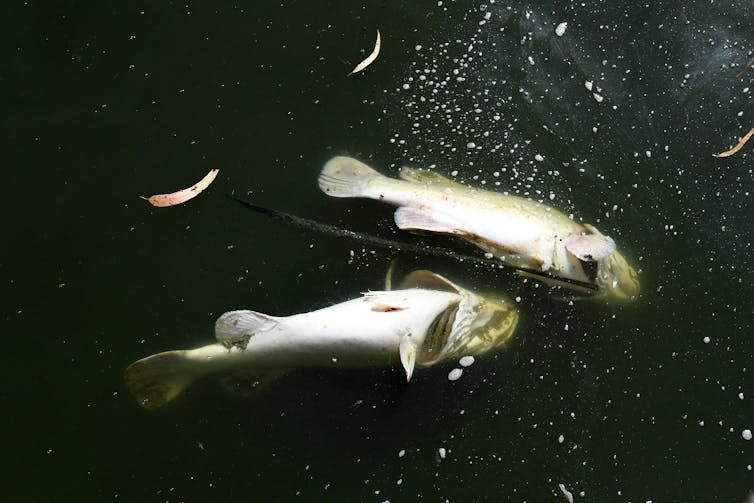A referendum won't save the Murray-Darling Basin
- Written by Adam Webster, Departmental Lecturer in Law and Public Policy, Blavatnik School of Government, University of Oxford
As part of its election campaign the Centre Alliance party (formerly the Nick Xenophon Team) has proposed a referendum give the Commonwealth power to regulate the waters of the Murray-Darling Basin.
The proposal would amend the constitution to give the Commonwealth legislative power over:
the use and management of water resources that extend beyond the limits of a State.
The proposal is intended to give the Commonwealth “clear authority” to regulate water resources that cross state borders, such as the Murray-Darling Basin and the Great Artesian Basin.
Read more: The Darling River is simply not supposed to dry out, even in drought
But it’s not clear a referendum would solve any of the problems currently facing the Basin. The Commonwealth already has plenty of power: it’s cooperation and environmental consciousness we lack.
Who controls the Murray-Darling Basin?
At a Basin-wide level, the distribution of water within the Murray-Darling Basin is presently governed by the Water Act 2007. The Act requires the creation of a Basin Plan, which provides a framework for water management across the Basin. The current Plan came into force in 2012.
The power to implement parts of the Water Act is supported by a referral of power from the states. That is, the states have passed their legislative power to the Commonwealth.
It is legally uncertain as to the extent this referral of power is necessary, and what would happen if a state withdrew its referral. The High Court has not had to consider these difficult constitutional questions.
Is a referendum necessary?
Before resorting to a referendum, it’s worth considering the extent of the Commonwealth’s existing power to regulate the Murray-Darling Basin. Although the Water Act is supported partly by a referral of power from the states, the Commonwealth has considerable legislative power it can deploy to regulate the Basin.
The constitution gives the Commonwealth power to make laws with respect to external affairs, corporations, and trade and commerce.
Read more: Aboriginal voices are missing from the Murray-Darling Basin crisis
In particular, the “external affairs” power – which gives the Commonwealth legislative power to meet international obligations – is relied upon considerably to support the Commonwealth enacting the Water Act.
These conventions include the Ramsar Convention on Wetlands of International Importance, the Biodiversity Convention, the Bonn Convention and the United Nations Convention to Combat Desertification.
While the Commonwealth probably has greater power to regulate interstate rivers than it currently exercises, it has not sought to flex its muscle and test the limits of these powers.
 Mass fish deaths in the Darling river earlier this year have raised serious concerns about the future of the Basin.
AAP Image/Dean Lewins
Mass fish deaths in the Darling river earlier this year have raised serious concerns about the future of the Basin.
AAP Image/Dean Lewins
What is the problem with the current Water Act and Basin Plan?
The South Australian Murray-Darling Basin Royal Commission examined the constitutional basis for the Water Act as well as other legal issues surrounding the operation of the Act and implementation of the Basin Plan.
This commission found the fundamental issue with the Basin Plan is it did not prioritise environmental sustainability highly enough, as the Water Act requires.
The Murray-Darling Basin Authority (MDBA) uses a “triple bottom line” – taking into account environmental, economic and social factors – when deciding how much water to take out of the rivers.
While this approach is supported by legal advice from the Australian government solicitor, the commissioner said relying on that advice was an error.
The Water Act requires the Plan include a:
maximum long-term annual average quantities of water than can be taken, on a sustainable basis, from the Basin water resources as a whole.
The commissioner concluded that this means the MDBA should put environmental priorities above social and economic considerations. This would mean more water returned to the environment.
Crucially, the commissioner did not take issue with the constitutional basis of the Water Act. The problem is one of priorities and interpretation of the Water Act, not the scope of the Commonwealth’s power.
Does a referendum solve the current problems?
Even if the proposed referendum went ahead, it would be unlikely to resolve interstate disputes concerning the distribution of water.
The constitutional amendment proposed by Centre Alliance would also place a limit on Commonwealth legislative power by prohibiting any federal law from having:
an effect on water resources that would have an overall detrimental effect on the environment.
This amendment raises as many questions as it seeks to resolve. What would constitute an “overall detrimental effect” on the environment? As a question of constitutional interpretation, it would be for the High Court to determine the meaning of these words. Any ambiguity surrounding the meaning of this provision is only likely to shift the battle over the Murray-Darling Basin to the courtroom.
Read more: Murray-Darling report shows public authorities must take climate change risk seriously
The solution does not lie in constitutional amendment or a courtroom battle. Instead, as the Royal Commissioner noted, the solution lies in “co-operative federalism”. The states and the Commonwealth must put “short-sighted, vested self-interests” to one side and work together in a manner that ensures the long-term viability of the Basin.
Authors: Adam Webster, Departmental Lecturer in Law and Public Policy, Blavatnik School of Government, University of Oxford
Read more http://theconversation.com/a-referendum-wont-save-the-murray-darling-basin-116750




